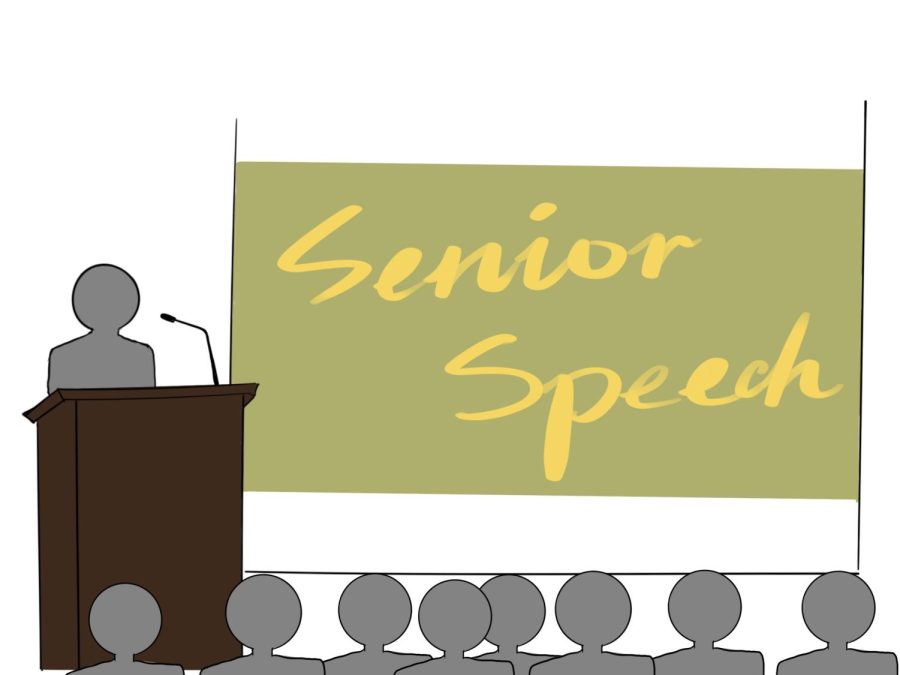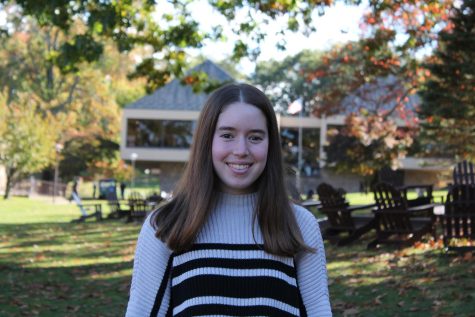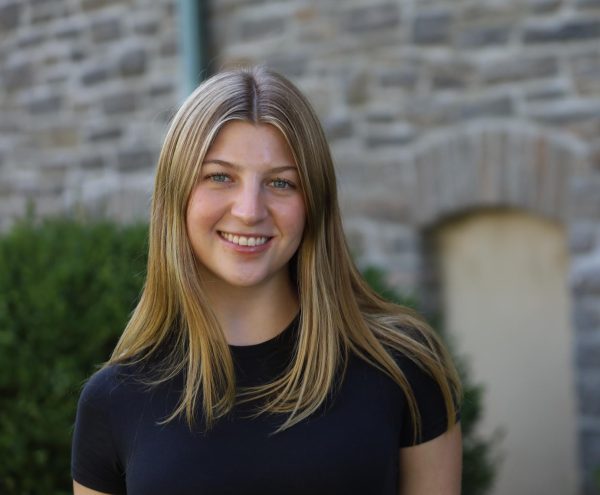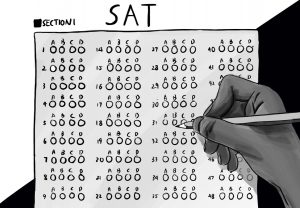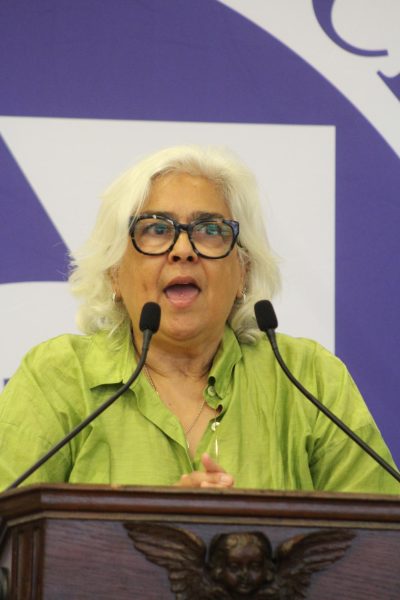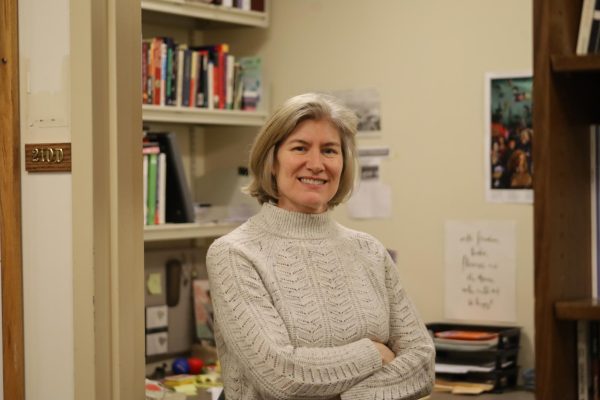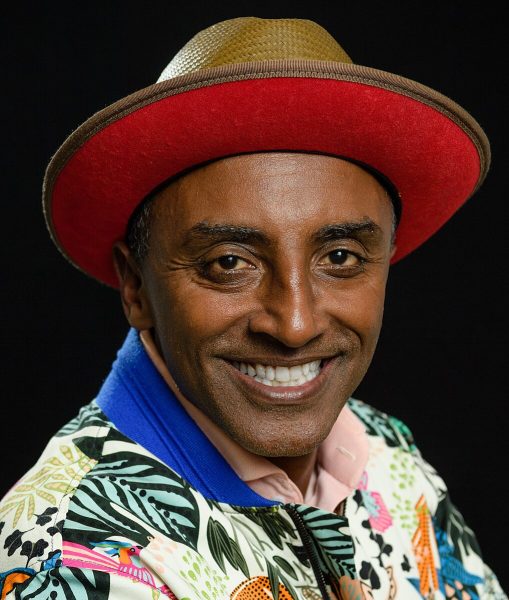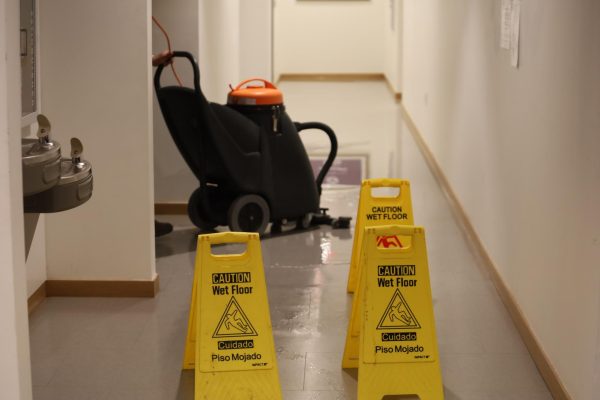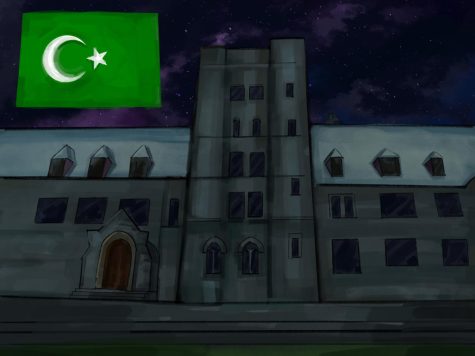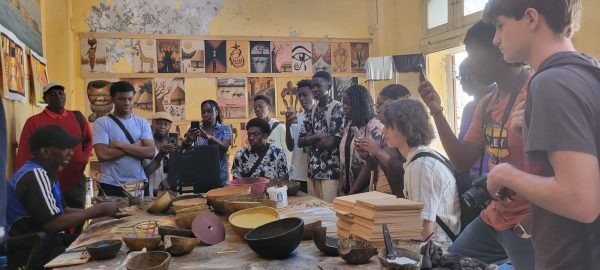Newcomb stops senior mid-speech, leaves Masters community speechless
Senior speeches are a tradition that has spanned across Masters’ history. The speeches are used to impart wisdom, comedic relief, or to share insights from the seniors. The first senior speech this year was by Lauren Marlowe ’23.
February 3, 2023
On Dec. 14, the Upper School community sat in shock as Head of Upper School Peter Newcomb walked down towards the podium where senior Ben New was delivering his senior speech and whispered a message into his ear. New had been forced to stop. As the senior returned to his seat, the audience erupted in celebration and gave him a standing ovation. According to an informal Tower Instagram survey, 87 percent of the 179 people who answered said they did not approve of Newcomb’s decision to cut New’s speech short.
“In the moment, it caught me off guard. Mr. Newcomb said to me ‘You have to stop your speech, but you can go again.’ I was thankful that I could get a second opportunity,” New said.
As a member of the Morning Meeting tech team, New usually stays behind the scenes, ensuring that all of the technical aspects, including presentations, videos, sound, and lighting, run smoothly. But this time he was in the spotlight, literally.
New’s speech was a humorous look at stereotypes regarding certain states and cities, such as New Jersey, Ohio, and Oklahoma. For example, New took a dig at Ohio for the infamous 1969 Cuyahoga River fire, noting “one of Ohio’s biggest cities, Cleveland, the river caught on fire. How on Earth does the river catch on fire?…It’s horrible.”
Newcomb told Tower, “[I] was really trying to see where it was going, to see if it was going to pivot away from where it had started, and to give a little bit of grace and trying to find that balance as to is this headed in a direction that feels like it would be OK because right now it’s not feeling that way. And so, when it didn’t turn, apparently at Oklahoma, is when I went up.”
In his four years as Head of Upper School, Newcomb said this was the first time he had ever stopped a senior mid-speech.
Last year, Finn Alexander ‘22 used the senior speech platform to not only celebrate his years at Masters but also to communicate his frustrations with the Masters administration following the expulsion of his twin brother and fellow student Mac. Newcomb said that it never crossed his mind to stop Alexander’s speech or any speech regarding comments in response to the administration. “I think it’s important that students have the space to challenge [school decisions],” he said.
The senior class dean is responsible for reviewing senior speeches prior to delivery. Class of 2023 Dean Darren Wood said that New’s satirically-written speech was a difficult tone for which to read and he recommended multiple changes about purpose and audience impact during the review process.
“I think there were a number of moments [in his speech] that, looking back, I don’t think I figured out quite right,” Wood said.
“The reason that I went up and chatted with Ben at that moment was to protect the students and the community members that were either from those states or that had family in those states,” Newcomb told Tower. “[Ben] was in a really hard position and a confusing one because there was a disconnect between Mr. Wood and myself. I think Ben did a really great job of navigating that public difficult moment.”
Senior speeches are a unique opportunity for Masters seniors. While Wood said that there is no prescribed subject matter for speeches, he said that students are encouraged to consider speech purpose, tone, and how it will land with different audiences. Traditionally, students have used this time to share advice or a memorable experience while at Masters, to express gratitude for someone, or to reflect on a part of one’s identity.
Sophomore Molly Brooks said, “I find it interesting to hear different perspectives from the seniors at school because they’re our role models as we’re advancing through our high school years. But it can also get a little bit redundant because sometimes there is crossover between speeches.”
Senior speeches are three to four minutes in length and required to be submitted at least two school days in advance for review prior to delivery at Morning Meeting. Seniors sign-up in September to indicate their interest in delivering a speech, as well as their date preference. This year, fifty seniors have signed-up and Wood said that a few are currently on the waitlist.
Wood said, “I think you need to give some latitude to the kinds of speeches that students will write, and it is a tricky thing to know how to establish a criteria about what’s appropriate or not appropriate.”
New said that he received many questions following the conclusion of the Dec. 14 Morning Meeting about what Newcomb told him at the podium. He also said that there was a mix of reactions to his speech from both students and faculty. While the reaction in the Claudia Boettcher Theatre seemed to indicate New’s speech was positively received, Newcomb said that there were community members who expressed concern and felt offended.
“I tried my best to say that I wanted to separate the people from the States and to make clear that it was more in a comedic tone. I do not have negative opinions about places that people are from,” New told Tower. “My intention was just to try to lighten the mood of this morning meeting and make it more of a memorable experience,” he said.
Junior Class President Arjun Ratan was surprised by Newcomb’s decision. “I knew [his speech] was meant to be fun and light-hearted, and I think Ben did a good job of proving that.” Ratan said. “The halt to his speech could’ve been handled differently, especially because the speech had been reviewed prior to delivery.”
Masters prides itself on freedom of expression and speech. As stated in the Masters mission statement, students are encouraged “to learn, to strive, to dare, to do — to be a power for good in the world.”
Newcomb said, “My frustration was not with Ben or with the process. I think part of what we do really well here [at Masters] is giving agency to students’ voices.” He added, “[Morning Meeting] is going to go off the tracks sometimes and that’s OK.”



